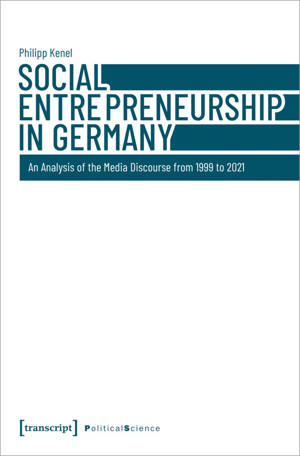
Bedankt voor het vertrouwen het afgelopen jaar! Om jou te bedanken bieden we GRATIS verzending (in België) aan op alles gedurende de hele maand januari.
- Afhalen na 1 uur in een winkel met voorraad
- In januari gratis thuislevering in België
- Ruim aanbod met 7 miljoen producten
Bedankt voor het vertrouwen het afgelopen jaar! Om jou te bedanken bieden we GRATIS verzending (in België) aan op alles gedurende de hele maand januari.
- Afhalen na 1 uur in een winkel met voorraad
- In januari gratis thuislevering in België
- Ruim aanbod met 7 miljoen producten
Social Entrepreneurship in Germany
An Analysis of the Media Discourse from 1999 to 2021
Philipp Kenel
€ 144,45
+ 288 punten
Omschrijving
Public and political interest in social entrepreneurship (SE) is increasing while it remains a contested and ambiguous concept. Philipp Kenel traces the popular media representation of SE in Germany over time (1999--2021), making an important empirical contribution to the sociological and political understanding of the phenomenon. He shows that until 2008, SE was mainly understood as a reform of the welfare infrastructure (including public and non-profit institutions). From 2009, SE was increasingly conceptualised as part of the economy, while sometimes challenging and other times reaffirming mainstream economic logics. More recently, in somewhat competing perspectives, SE has been framed as part of the >start-up
Specificaties
Betrokkenen
- Auteur(s):
- Uitgeverij:
Inhoud
- Aantal bladzijden:
- 288
- Taal:
- Engels
- Reeks:
- Reeksnummer:
- nr. 173
Eigenschappen
- Productcode (EAN):
- 9783837673159
- Verschijningsdatum:
- 3/06/2025
- Uitvoering:
- Hardcover
- Formaat:
- Genaaid
- Afmetingen:
- 152 mm x 229 mm
- Gewicht:
- 557 g

Alleen bij Standaard Boekhandel
+ 288 punten op je klantenkaart van Standaard Boekhandel
Beoordelingen
We publiceren alleen reviews die voldoen aan de voorwaarden voor reviews. Bekijk onze voorwaarden voor reviews.









